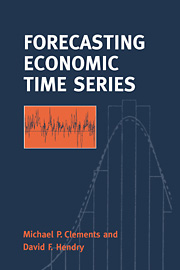Book contents
- Frontmatter
- Contents
- List of figures
- List of tables
- Preface
- Common acronyms
- 1 An introduction to forecasting
- 2 First principles
- 3 Evaluating forecast accuracy
- 4 Forecasting in univariate processes
- 5 Monte Carlo techniques
- 6 Forecasting in cointegrated systems
- 7 Forecasting with large-scale macroeconometric models
- 8 A theory of intercept corrections: beyond mechanistic forecasts
- 9 Forecasting using leading indicators
- 10 Combining forecasts
- 11 Multi-step estimation
- 12 Parsimony
- 13 Testing forecast accuracy
- 14 Postscript
- Glossary
- References
- Author index
- Subject index
14 - Postscript
Published online by Cambridge University Press: 02 November 2009
- Frontmatter
- Contents
- List of figures
- List of tables
- Preface
- Common acronyms
- 1 An introduction to forecasting
- 2 First principles
- 3 Evaluating forecast accuracy
- 4 Forecasting in univariate processes
- 5 Monte Carlo techniques
- 6 Forecasting in cointegrated systems
- 7 Forecasting with large-scale macroeconometric models
- 8 A theory of intercept corrections: beyond mechanistic forecasts
- 9 Forecasting using leading indicators
- 10 Combining forecasts
- 11 Multi-step estimation
- 12 Parsimony
- 13 Testing forecast accuracy
- 14 Postscript
- Glossary
- References
- Author index
- Subject index
Summary
The book has discussed economic forecasting in processes that are reducible to stationarity after differencing or cointegration transforms. It explicitly allowed for the model being used to be a mis-specified representation of the data generation process, and for the evaluation of forecast accuracy by MSFEs to depend on which isomorphic form of the model was used. This chapter looks back at the results established, and forward to our other book which addresses processes that are subject to structural breaks. We showed that many results changed radically when parameter non-constancy was introduced: examples above included the role of causal variables in forecasting relative to non-causal; the value added that could follow from intercept corrections or differencing; and encompassing when models were differentially susceptible to structural breaks. These are the focus of the Zeuthen Lectures, where we will investigate economic forecasting in the face of structural breaks, delineate its main causes, and evaluate their importance by Monte Carlo experiments and empirical examples.
- Type
- Chapter
- Information
- Forecasting Economic Time Series , pp. 329 - 334Publisher: Cambridge University PressPrint publication year: 1998



